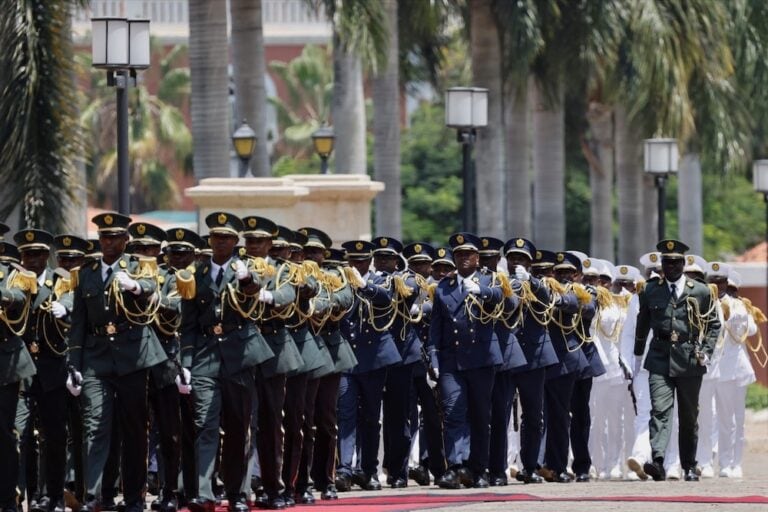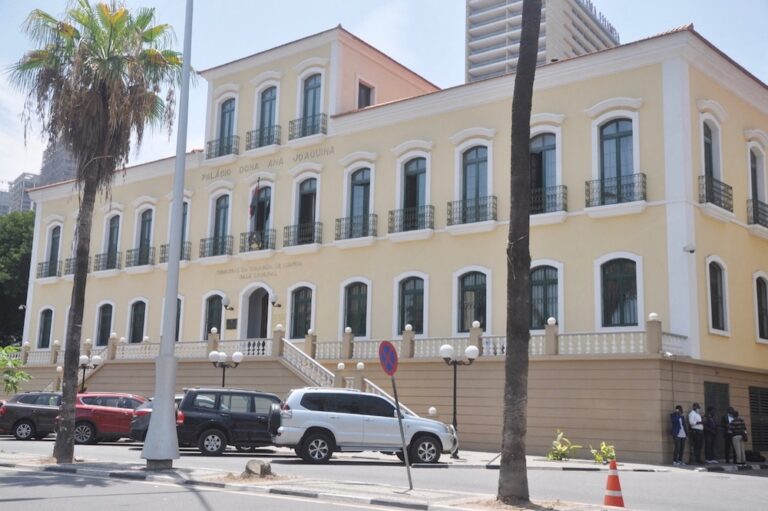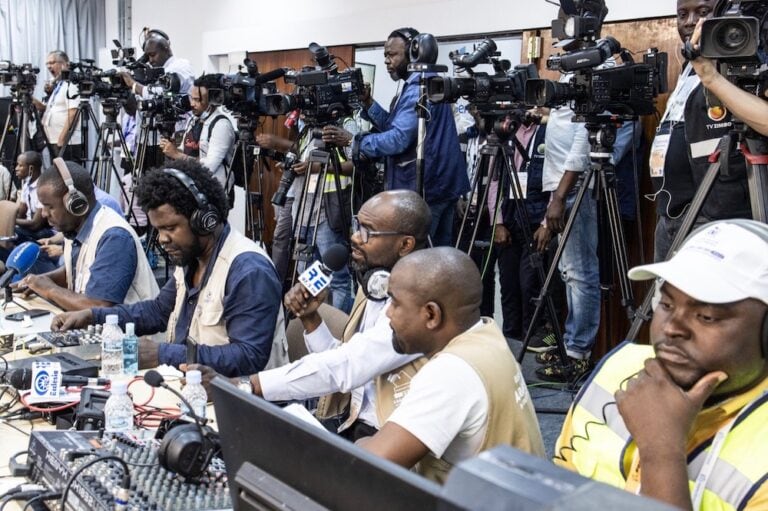(MISA/IFEX) – On 23 September 1999, Angolan Attorney General (AG) Domingos Culolo issued a statement recognising “the value and benefit of the press in a democratic state” and their role in “the permanent fight against all forms of illegalities in general and crime in particular.” Culolo said that the law must be placed between the […]
(MISA/IFEX) – On 23 September 1999, Angolan Attorney General (AG) Domingos
Culolo issued a statement recognising “the value and benefit of the press in
a democratic state” and their role in “the permanent fight against all forms
of illegalities in general and crime in particular.” Culolo said that the
law must be placed between the “excessive zeal of some agents of the
Criminal Investigation Police Department (DNIC) and the excessive passion of
some journalists to regulate and arbitrate the conflicts that may occur.”
**For background on recent incidents involving journalists see IFEX alerts
of 16 September, 14 September, 7 September, 17 August, 13 August, 11 August
and 10 August 1999**
In the statement, the AG said that the DNIC “has legal powers to initiate
investigations whenever there is a well-founded suspicion of crimes of a
public or semi-public nature.” However he cautioned that “the only duty of
DNIC is to investigate into the facts with professionalism and with strict
observance of the law, particularly the norms which regulate the
investigations, and that the legal proceedings and final judgments should be
left to the courts.”
The statement concluded that the attorney general’s office “will continue to
guarantee legality in general and from that perspective, it will maintain
its role in the persecution of fraudulent and negligent violations of the
juridical norms in force including abuses of authority and the Press.”
The statement from the AG followed a 21 September meeting between the AG and
the secretary general of the Angolan Union of Journalists (SJA), Avelino
Miguel. The meeting came after a lengthy letter to the AG by the SJA
expressing the organisation’s concern over the recent developments involving
journalists in the country.
In the letter, the SJA described the situation as characterised by
“inadequate treatment that journalists and respective media have received
from the DNIC in contradiction of the principles of a democratic state of
law.”
Recalling recent incidents involving journalists, and with particular
reference to the police raid on the church-owned Radio Ecclesia in August,
the SJA said that Radio Ecclesia had been “literally forced by the DNIC
agents to sign an editorial agreement under an environment of complete
psychological pressure” in a move that included three other journalists from
the state-run television, TPA.
In the letter, the SJA highlighted the recent interrogations of journalists
in Luanda, including “Folha 8” director William Tonet, the violent arrest of
journalist Gilberto Neto and the incidents in the provinces of Malange and
Bie, as a clear attempt to force confessions about the sources quoted in
their reports and articles. The SJA questioned if these practices had any
legal standing under current legislation. “It seems journalists lose their
freedom immediately after receiving a summons from DNIC,” the document said.
The letter quoted the Angolan Press Law which says, “Nobody can suffer
prejudice in his/her private, social and professional life by virtue of
having exercised the legitimate right to express freely his/her ideas
through the press”. Another chapter quoted says that “journalists cannot be
forced to reveal their sources and their silence cannot be subject to direct
or indirect sanction”.
The SJA went on to appeal to the AG in his capacity as high magistrate for
an end to the intimidation of journalists and the restriction of press
freedom through the actions of the police. The organisation also asked for
the conclusion of investigations into the murders of Angolan journalists
including Ricardo de Mello, Antonio Casimiro, Zau Bunga, Simao Roberto and
Mauricio Cristovao. The union also requested an explanation of the concept
of a crime against the state security, which had often been cited by the
police, arguing that this crime as currently articulated collides with the
legal scope of rights guaranteed by the current Constitutional framework.
Speaking on 21 September following his meeting with the AG, Miguel from the
SJA said that the AG had promised to take action against the police and the
Ministry of Social Communication in order to “put an end to press freedom
violations.” Miguel stated that the conclusion by the AG was that press
freedom offences did not fall under the state security laws and he gave the
assurance that cases involving journalists would be investigated in terms of
the press law. The AG complained about the fact that the press activity in
Angola had been regulated and limited by a police general command order
issued on 11 August in the aftermath of the Radio Ecclesia episode.
“They have to stop and bring things to order. The government cannot treat
journalists as political foes arresting and interrogating them under the
obsolete law of crimes against state security,” the AG was quoted as having
said.
Expressing his satisfaction at the outcome of the meeting, Miguel said “this
was a remarkable victory.” He added that it gave a sigh of relief to
independent journalists, who feared the worst after the state-owned media on
19 September circulated a strongly-worded editorial stating that “the organs
of sovereignty cannot look on indifferently to the subversive activities
developed through some of the so-called independent media” in support of the
enemies of the government.
Background Information
The media in Angola have been suffering a serious clampdown since the
beginning of the year amid a full-out resumption in conflict between the
government and the UNITA rebel movement. However, since June the clampdown
has been characterised by particularly violent and draconian incidents after
the Minister of Social Communication, Hendrik Vaal Neto, warned of a
crackdown against journalists who were “unpatriotic” or allegedly “inciting
treason”. The minister clearly stated that the Angola government was
considering “resorting to violence” against independent media which did not
support the government in its war against UNITA.
Between 19 August and 8 September, at least eight journalists, including
several foreign correspodents, were interrogated in connection with articles
written for local media or reports filed for overseas media. The actions
against the journalists pointed to a full-out campaign by the government to
discourage commentary and reporting on the civil war.
On 8 September, the government imposed a ban on the transmission of foreign
news programmes. As a result, the church-owned Radio Ecclesia suspended
broadcasts of an African news service from the Catholic Church in Portugal.
The Ministry of Communication reportedly informed the station that the daily
news programme from Lisbon could no longer be aired. It’s not clear,
however, if this ban has affected foreign broadcasts carried by other
independent stations.
Earlier, on 9 and 10 August, police held a total of four journalists from
Radio Ecclesia after the station re-broadcast an interview with UNITA rebel
leader Jonas Savimbi. Police also confiscated the material containing the
interview. Four other journalists, including three from state-television
TPA, were also summoned for questioning by DNIC on 10 August. The TPA
apparently also broadcast the contentious Savimbi interview, which was first
broadcast on the BBC. The four were questioned briefly before being
released. The Director of Radio Ecclesia, Antonio Jaka, later reported that
the police had forced him to sign a bond in terms of which the station would
never broadcast any material featuring UNITA and Jonas Savimbi without the
authorisation of the Ministry of Interior.
In a 10 August press release from the Police General Command, the police
said the journalists had been taken in for questioning because both Radio
Ecclesia and the TPA had committed a crime against the internal and external
security of the state by broadcasting the Savimbi interview. The police
statement went on to say that Radio Ecclesia and the TPA had contravened
articles 8 and 9 of Law 7/78 of 1978 and that investigations would continue
to “clarify the facts and the true intentions that led to the publication of
the interview.”
Law 7/78, also known as the Law on Crimes against State Security, was a
notorious law enacted shortly after a failed coup attempt in 1977. In terms
of this law, crimes against the ruling party were incorporated into crimes
against state security. This law went contrary to Article 35 of the
Constitution, which guaranteed the right to freedom of expression. The
Constitution was adopted in 1992, however, in the absence of a functioning
Constitutional Court in Angola, the law cannot be challenged.
An earlier chronology of incidents affecting media workers in Angola since
January this year can found on the Internet at:
http://www.misanet.org/alerts/19990707.angola.0.html


